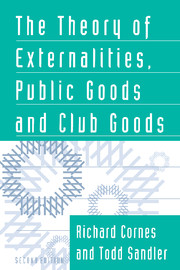Book contents
- Frontmatter
- Contents
- List of tables and figures
- Preface
- Part I Introduction to the theory of externalities, public goods, and club goods
- Part II Externalities
- Part III Public goods
- Part IV Clubs and club goods
- 11 Homogeneous clubs and local public goods
- 12 Clubs in general
- 13 Institutional forms and clubs
- 14 Game theory and club goods
- 15 Uncertainty and the theory of clubs
- 16 Intergenerational clubs
- Part V Applications and future directions
- References
- Author index
- Subject index
14 - Game theory and club goods
Published online by Cambridge University Press: 05 June 2012
- Frontmatter
- Contents
- List of tables and figures
- Preface
- Part I Introduction to the theory of externalities, public goods, and club goods
- Part II Externalities
- Part III Public goods
- Part IV Clubs and club goods
- 11 Homogeneous clubs and local public goods
- 12 Clubs in general
- 13 Institutional forms and clubs
- 14 Game theory and club goods
- 15 Uncertainty and the theory of clubs
- 16 Intergenerational clubs
- Part V Applications and future directions
- References
- Author index
- Subject index
Summary
This chapter presents the game-theory formulation of club goods. By introducing game theory, we can finally address a number of unanswered questions concerning club formation and operation. In particular, a game formulation allows for a determination of the optimum number of clubs; that is, an optimum partition of a population into a system of nonoverlapping clubs can be devised. A by-product of this determination will be a better answer to the question posed in Chapters 11 and 12 concerning what constitutes the optimum club size. The stability of clubs can also be examined with game-theoretic notions, whereby the membership composition and payoffs can be related to the core of a game. In a stable system of clubs, the membership composition remains fixed, since reshuffling between clubs would not improve an individual's net benefits.
Game theory also permits a reexamination of institutional form in terms of the Ψ-stability function, which can account for transaction costs. Furthermore, by placing bounds on the extent of discrimination of payoffs between members, game theory can be related to the differentiation between membership subgroups, alluded to in Chapter 13 when authority was mentioned. Cost-allocation schemes can also be elucidated with game theory. Thus, clubs deriving their benefits from cost sharing, as in the case of goods whose production is characterized by increasing returns to scale, can be analyzed with game theory.
The theory of n-person cooperative games, developed by John von Neumann and Oskar Morgenstern (1944), provides a natural formulation of club problems.
- Type
- Chapter
- Information
- The Theory of Externalities, Public Goods, and Club Goods , pp. 415 - 434Publisher: Cambridge University PressPrint publication year: 1996



